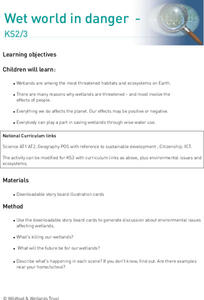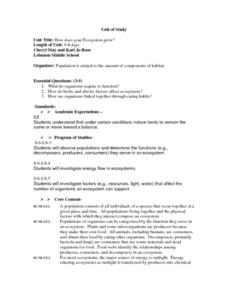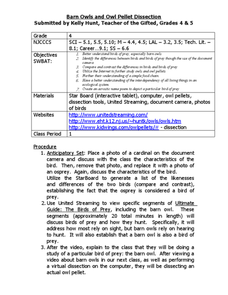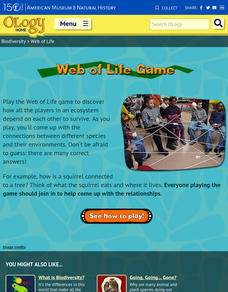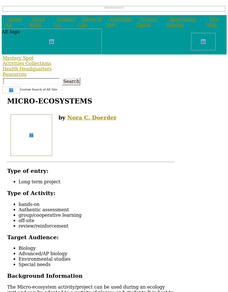Curated OER
Exploring Microclimates
Students compare the land cover and temperatures in different microclimates to begin to explain why organisms live where they do. While exploring microclimates, students record temperature readings and detailed observations.
Virginia Department of Education
Owl Family Natural Selection
How do genetic mutations within a population lead to future variations? Provide your class with the resources to answer this question and more upon completing an activity on natural selection. The entire class participates in a...
Curated OER
If the Forests Could TAlk
Third graders research insects using the internet sites provided. They research the role of insects as pollinators for plants, and the impact they have on our ecosystem. They participate in various activities/centers utilizing the facts...
Curated OER
Visual Vocabulary
Students interpret and name the vocabulary termed acted out by the mime. In this science/language arts/physical education instructional activity, students are given a set of vocabulary terms to discuss within their group. Next, students...
Howard Hughes Medical Institute
BiomeViewer
Which holds more influence, the environment over humans or humans over the environment? Young scientists explore an online interactive that addresses this discussion. They observe changes in the natural world over time and see which...
Howard Hughes Medical Institute
Niche Partitioning and DNA Metabarcoding
What is DNA metabarcoding? Show your biology class the latest method for studying biodiversity in an ecosystem with a fun, informative interactive. Individuals examine the animal species that compete for vegetation, then learn how their...
Curated OER
Investigative Case - "Swampeast Missouri"
Students explore wetland hydrology and biology and decide whether or not to restore a wetland or retain dams and drainage systems. They examine the complexity of decisions regarding wetland restoration as well as investigate viewpoints...
Curated OER
Wet World in Danger
Students investigate the reasons why wetlands are threatened especially by people. They study the wise use of water to preserve wetlands.
Curated OER
The Circle of Life
Fourth graders examine how the different organisms living in an ecosystem affect one another. In groups, they research a specific ecosystem and present their findings to the class based on the type of organisms found in it. To end the...
Curated OER
How Does Your Ecosystem Grow?
Students consider that under certain conditions in nature tend to remain the same or move toward a balance. They observe populations and determine the functions (e.g., de-composers, producers, consumers) they serve in an ecosystem. They...
Curated OER
Rocky Shore Food Web Drama
Students explore food chains. In this ecosystem lesson, students discover how plants and animals rely on each other for survival. Students research the rocky shore ecosystem and create a skit representing the ecosystem.
Curated OER
Who Eats Whom in the Salt Marsh?
Seventh graders complete a virtual online salt marsh tour. In groups, they observe and identify the various types of animals found in the marsh. After categorizing the animals, they create a food web based on the animals role in the...
Curated OER
Barn Owls and Owl Pellet Dissection
Students explore birds of prey and food chains. In this ecosystems and birds of prey cross curriculum science and literacy lesson, students brainstorm characteristics of birds after viewing photographs. Students view a video and document...
American Museum of Natural History
Web of Life Game
Get caught in a web of learning. Classmates play a game to build a web to model the interaction of species that live in a specific ecosystem. They each assume the role of one species and work together, passing a ball of twine to indicate...
Wild BC
Bearly Any Ice
After reviewing food chains, your class members participate in an arctic predator-prey game that exemplifies the impact of climate change of food availability. If you are in a hurry, skip this lesson, but if you have the time to...
NOAA
Deep-Sea Ecosystems – Entering the Twilight Zone
Imagine an ecosystem without any light or oxygen, where living things convert carbon dioxide into food. This ecosystem is thriving and might just be the largest ecosystem on our planet, yet we know very little about it. The lesson...
NOAA
Deep-Sea Ecosystems – Life is Weird!
A pool of brine in the deep sea can be up to four times as salty as the surrounding sea water. The deep sea ecosystem relies on chemosynthesis and the organisms that live there are often strange to us. The lesson focuses on researching...
Virginia Department of Education
Passing Traits to Offspring
What makes each one of us unique? Lead your class in this exciting and educational activity as you uncover traits that show how each individual is different from another. Pupils explore facts about DNA technology and predict the...
Consortium for Ocean Science Exploration and Engagement (COSEE)
Life in an Ocean World
How does the shell color of crabs and the habitat they live in impact the predator-prey relationship? The fourth lesson in a series of five is a game where participants try not to get eaten if they are a prey and try to eat if they are...
Curated OER
Forest Ecosystem
Students become familiar with the temperate rainforest. For this forest ecosystem lesson, students identify the producers, consumers and decomposers in the forest ecosystem. Students sort cards and identify the trophic level...
Curated OER
Bugs in the Woods
Second graders identify insects and plants in the forest ecosystem in a structured field trip with stations and activity booklets. In this bugs lesson, 2nd graders explore the ecosystem of the forest, complete the booklet and play...
Curated OER
Your Own Fresh Water Aquarium in the Classroom
Students explore aquariums. In this fish and ecosystems lessons, students establish a freshwater aquarium environment using materials provided. Students read about and care for the classroom fish.
Curated OER
Regents High School Examination: Living Environment 2005
The 2005 version of the Regents High School Examination in the area of ecology is as comprehensive as previous years' exams. It consists of 40 multiple choice questions on everything from the structure of DNA to the interactions within...
Curated OER
Micro-Ecosystems
Students create a sustainable, self-contained ecosystem in a ten-gallon aquarium.







